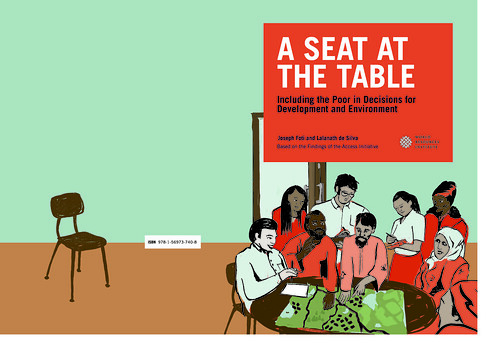Published: 2010
Including the Poor in Decisions for Development and Environment
For the complete publication please scroll to the bottom of the page and download the attachment.
Download the original case studies on access rights and poverty referenced in the A Seat at the Table publication here: A Seat at the Table Pilot Studies on Access Rights and Poverty View the presentation from the A Seat at the Table Brown Bag hosted at the World Resources Institute here: A Seat at the Table Presentation
Watch the webcast of the A Seat at the Table Brown Bag hosted at the World Resources Institute here:
Decisions that have significant environmental and social consequences are often made without the involvement of those whose interests are directly at stake. For poor people whose lives and livelihoods often depend on natural resources, and who are therefore most vulnerable to environmental risks, the consequences of exclusion can be especially severe. Weak access to decision-making may expose poor communities to high levels of pollution, remove them from productive land, and deprive them of the everyday benefits provided by natural resources.
The three pillars of sound decision-making for the environment that are key to responding to the challenge of providing “access” are: access to information, public participation, and access to justice. Many countries, regardless of their level of economic development, have promoted these pillars as policy aspirations or as enforceable legal rights. Yet even where progress has been significant, more work remains if such laws are to be implemented in a way that is meaningful to all citizens, especially the poor.
To better understand the obstacles to access facing the poor, and the efforts by governments to reach this population, the World Resources Institute (WRI) and its civil society organization (CSO) partners in The Access Initiative1 (TAI) closely examined access rights and practices in four countries—Cameroon, Paraguay, Philippines, and Sri Lanka.2
The case studies highlighted in this report cover a range of environmental concerns including water quality, land use, data availability, and the use or absence of environmental impact assessments (EIAs). The findings and literature review show that the poor in these countries face a daunting array of barriers to access, including low literacy, high costs (including the costs of corruption), exposure to risk from participation, and lack of documentation of legal identity or rights to a resource that is necessary to influence decisions. Additionally, cultural norms that limit who may speak in public disproportionately exclude the poor.
The case studies also provide examples where civil society organizations, community groups, and—most importantly—governments have taken steps to overcome these barriers. Based on the findings and literature review, we have identified six poverty-related barriers to access to decision-making and proposed eight categories of policy responses to overcome these barriers. Importantly, a general lack of access to information for all citizens had a commensurately larger impact on access to information for the poor.
—————————————————————————————
Incluyendo a los pobres en las decisiones sobre Ambiente y Desarrollo
Las decisiones que tienen significativas consecuencias ambientales y sociales se hacen a menudo sin la participación de aquellos cuyos intereses están directamente en juego. Para los pobres, cuyas vidas y medios de vida a menudo dependen de los recursos naturales, y que son más vulnerables a los riesgos ambientales, las consecuencias de la exclusión pueden ser especialmente graves. Un débil acceso a los procesos de toma de decisiones puede exponer a las comunidades pobres a altos niveles de contaminación, excluirlos de la tierra productiva, y privarlos de los beneficios diarios que proporcionan los recursos naturales.
Los tres pilares de la adopción de decisiones acertadas para el medio ambiente que son clave para responder al desafío de proporcionar “acceso” son: el acceso a la información, participación pública y acceso a la justicia. Muchos países, independientemente de su nivel de desarrollo económico, han promovido estos pilares como aspiraciones de políticas o exigibilidad legal de derechos. Sin embargo, incluso donde el progreso ha sido significativo, aún queda mucho trabajo si esas leyes no son aplicadas de manera significativa para todos los ciudadanos, especialmente los pobres.
Para comprender mejor los obstáculos al acceso que enfrentan los pobres, y los esfuerzos de los gobiernos para llegar a esta población, el Instituto de Recursos Mundiales (WRI) y las organizaciones de la sociedad civil (OSC) socias de la Iniciativa de Acceso (The Access Initiative) examinaron a profundidad los derechos y las prácticas de acceso en cuatro países: Camerún Paraguay, Filipinas y Sri Lanka.
Los estudios de casos destacados en este informe cubren una gama de preocupaciones ambientales, la calidad del agua, uso del suelo, disponibilidad de datos y el uso o ausencia de evaluaciones de impacto ambiental (EIA). Las conclusiones y revisión bibliográfica muestran que los pobres de estos países enfrentan una serie de desalentadoras barreras al acceso, incluyendo el bajo nivel de alfabetización, los altos costos (incluyendo los costos de la corrupción), la exposición a los riesgos derivados de la participación, y la falta de documentación de identidad legal o derechos a un recurso que es necesario para influir en la toma de decisiones. Además, las normas culturales que limitan quién puede hablar en público de manera desproporcionada excluyen a los pobres.
Los estudios de casos también proveen ejemplos donde las organizaciones de la sociedad civil, grupos comunitarios, y-más importante-los gobiernos han adoptado medidas para superar estas barreras. Con base en los resultados y revisión de la literatura, se identificaron seis barreras relacionadas con la pobreza con el acceso a la toma de decisiones, y se propusieron ocho categorías de respuestas de política para superar estas barreras. Es importante destacar que la falta general de acceso a la información para todos los ciudadanos tienen un impacto proporcionalmente mayor sobre el acceso a la información para los pobres.
The publication can also be found on the World Bank’s Water Quality page here: http://go.worldbank.org/WEXM7I9W50
